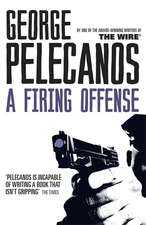The Hot Flash Club
Autor Nancy Thayeren Limba Engleză Paperback – 31 oct 2004
Meet Faye, Marilyn, Alice, and Shirley. Four women with skills, smarts, and secrets—all feeling over the hill and out of the race. But in a moment of delicious serendipity, they meet and realize they share more than raging hormones and lost dreams. Now as the Hot Flash Club, where the topics of motherhood, sex, and men are discussed with double servings of chocolate cake, they vow to help each other . . . and themselves.
Faye, the artist. A determinedly cheerful widow and connoisseur of control-top pantyhose, she’s struggling with creative block and an empty, lonely house. Now she’s got a tricky problem to bring to the club’s table: how can they catch her perfect son-in-law cheating on her only daughter Laura?
Shirley, the healer. Though her yoga-slender body belie her years, decades of dating losers and the strain of being broke make her feel her age. Shirley has a secret dream: a wellness spa that nurtures body and soul. But first she needs to believe in herself, in her abilities, and in her friends at the club.
Marilyn, the brain. A paleontologist who has spent so many years looking at dried-up fossils, she’s almost become one herself. Worried that her brilliant but nerdy son is about to marry the very wrong woman, she gets some help from the HFC, who transform her from a caterpillar to a butterfly, with amazing results.
Alice, the executive. Black and regal, she soared to the top of the corporate ladder. Now her shoes are murder on her arthritic back and the younger jackals are circling in for the kill. But as the inspiration behind the HFC, she’s about to discover something extraordinary: contentment.
For Faye, Shirley, Marilyn, and Alice, the time has come to use it or lose it—be it their bodies, their brains, their spirits, and their sense of fun. Together they realize that they can have it all, perhaps for the first time in their lives. And though what sags may never rise again, feeling sexy has no expiration date— and best of all, with a little help from her friends, a woman can always start over . . . and never, ever, give up what matters most.
From the Hardcover edition.
Preț: 112.74 lei
Nou
Puncte Express: 169
Preț estimativ în valută:
21.58€ • 22.44$ • 17.81£
21.58€ • 22.44$ • 17.81£
Carte disponibilă
Livrare economică 24 martie-07 aprilie
Preluare comenzi: 021 569.72.76
Specificații
ISBN-13: 9780345469168
ISBN-10: 034546916X
Pagini: 352
Dimensiuni: 132 x 206 x 19 mm
Greutate: 0.25 kg
Editura: BALLANTINE BOOKS
ISBN-10: 034546916X
Pagini: 352
Dimensiuni: 132 x 206 x 19 mm
Greutate: 0.25 kg
Editura: BALLANTINE BOOKS
Notă biografică
Nancy Thayer is the author of thirteen novels, including Custody, Between Husbands And Friends, An Act Of Love, Belonging, Three Women at the Water’s Edge, and Everlasting, which was a Main Dual selection of the Literary Guild. Her work has been translated into nearly a dozen languages. Her first novel, Stepping, was made into a 13-part series for BBC Radio and her ghost novel Spirit Lost has been optioned and produced as a movie by United Image Entertainment. In 1981 she was a Fellow at the Breadloaf Writers Conference. She has lived on Nantucket Island year round for nineteen years with her husband Charley Walters.
From the Hardcover edition.
From the Hardcover edition.
Extras
1
FAYE
It was while Faye was gathering donations for the community tag sale that she realized, with a shock, that any stranger going through her house would think she was obsessive, anal-retentive, or, at the very least, eccentric.
Although, if the stranger were a female around Faye’s age—fifty-five—she would probably understand what could appear to others as an unhealthy mania for clothes.
Naturally, Faye’s clothing hung in the large walk-in closet of her bedroom.
Also, in the guest bedroom closet.
And in the closet of her daughter’s bedroom, for Laura was twenty-eight, married, and had left only a few of her favorite childhood things at home.
Faye’s clothes did not hang in the attic, because when she and Jack bought the house thirty years ago, they converted the attic into a studio where Faye painted. But more of Faye’s clothes were hung, folded, or bundled in plastic wardrobes in the spacious linen closet at the end of the hall.
So much clothing!
She felt appalled, and slightly guilty.
It wasn’t just that Faye, like most women, changed her wardrobe for summer and winter and fall, or that, like many other women, she had casual clothes for daily life and some elegant suits for the various committees she sat on, and a few gorgeous dresses for the events she had attended with Jack, a corporate lawyer and head of his own prestigious Boston firm. It wasn’t only that she had Christmas sweaters and tennis skirts and the black velvet evening cloak that had been her mother’s, so how could she possibly part with it? Or that she’d kept the expensive, elegant raincoat she’d bought on a trip to London with Jack, where she’d torn the hem, stepping out of a black cab on the way home from the theater. She intended to mend it, but she hadn’t yet found time to do so. In the meantime, she’d bought another raincoat or two, to serve until she mended the London one. It wasn’t that during this long, gloomy spring, she’d bought, on an impulse, another raincoat, a rain slicker of cheery, cherry red.
It was that she had so many clothes for so many seasons and reasons in so many different sizes.
The size 12s were in Laura’s bedroom.
The size 14s were in the guest bedroom.
The size 16s were in the linen closet.
The size 18s were in her own closet, right next to her husband’s clothing. It was his clothing that had gotten her started on this spree in the first place.
One long year ago, Jack, her darling Jack, had died of a sudden heart attack, at the age of sixty-four.
In the middle of the night, Jack had sat up in bed, turned on the light, and said to Faye, “Don’t forget—” then clutched his chest and fell on the floor.
Don’t forget what? Faye wondered. It kept her awake at night, it made her walk right past her townhouse, it bit at her thoughts like a tack in her shoe. Don’t forget I love you? Don’t forget to tell Laura I love her? Don’t forget to look in the secret door in the Chippendale cabinet? (She’d looked there and found nothing.)
“He was sleeping,” her son-in-law Lars assured her. “He might have been dreaming. He might have been thinking something nonsensical, the ways dreams can be, like don’t forget to feed the giraffe.”
Now, a year after his death, her friends, and Laura, too, insisted that it really was time to part with his things. Laura and Lars had taken what they wanted. The rest, they reminded her, should not languish in her house when they could be useful to so many others. So Faye was diligently preparing to donate his clothes to the community fair. Most of them, anyway. She would keep a few items: his old robe, worn at the elbows, no good to anyone else, and so comforting to her, and the blue Brooks Brothers shirt he looked so handsome in. The rest she really would give away.
And she absolutely would give away some of her own clothing, too. At least the size 10s.
Although, Faye wondered, collapsing on the carpet and leaning against the bedpost—because her bedroom chairs and the bed were covered with clothing she’d sorted through—would giving away the size 10s be admitting she’d never be that size again? Would it be like giving up?
All her life, her weight had gone up and down more than the scales of a Tchaikovsky concerto.
Well, more up than down.
Faye loved to eat and never lost weight without fierce determination and control. Usually she weighed the most in early January, after the ounces and inches from the feasts and celebrations of Thanksgiving, Christmas, and New Year’s had accumulated, like a confetti of cellulite, onto her hips. She weighed the least in the summer, when the combination of dread of appearing in public in a bathing suit, and anticipation of light, floaty summer dresses, had driven her to diet down a size or two.
But three years ago, she’d had a hysterectomy for fibroid tumors—that had been wonderful, she’d lost several pounds while lying down! On doctor’s advice, she took the hormone replacement therapy that had been touted as a wonder drug until, a year ago, the same HRT was suddenly reviled as toxic by a hysterical press. She stopped using it, and now she weighed as much as she had when she was nine months’ pregnant.
She hadn’t been eating more than usual or exercising less. Just the opposite: Determined not to go creakily into old age, she exercised regularly. In general, she led an active life. In spite of that, and her increasing attention to what she ate, fat collected around her arms and thighs, under her chin, on her bottom and hips, and rose on her stomach, warm and rounded, like a freshly baked loaf of bread.
Long ago, Faye had vowed not to compare her physique to the skeletal models in magazines—her healthy body provided her with so many pleasures, why should she criticize it? She decided she’d try to cut down on fats and eat more veggies.
And she was trying.
But another loss had struck her, hard. Faye hadn’t told anyone about this, not Laura or her closest friends, because speaking of it might make it real, might make it lasting.
For thirty years, Faye had been a talented, respected artist whose contemporary Impressionist still lifes sold as fast as she could fin- ish them, making her quite well off, which she didn’t even need to be, since Jack, a successful corporate attorney, made more than enough money. It wasn’t the money that mattered anyway, it was the work, it was the daily mix of discipline, inspiration, knowledge, and risk that made painting so important to her. Through her painting, she interpreted the world. Through her painting, she expressed her gratitude for the luminous mysteries of any normal day.
Nine months after Jack’s death, Faye decided she must put an end to her grieving and try to paint again. After all, painting was one of the joys of her life. Jack would want her to paint. So she climbed the stairs to her third floor studio, set up a still life of red pears in a silver bowl, pulled on her smock, readied her paints, and lifted her brush. Several hours later, she stood perplexed and more than a little frightened by what she saw on the canvas. It was muddy, thick, dull.
She waited a few days, then tried again. But for the first time ever, painting was work, and at the end of the day, what she’d accomplished was not even mediocre.
Have patience, she told herself. Her mind needed time to remember its talents.
But time didn’t help, nor did patience. Playing Rachmaninoff in her studio didn’t help, nor did so many infusions of ginseng and other helpful herbs that she expected little green twigs to curl out her ears. The gift of painting, which had sustained her all her life, had simply vanished, and she had no idea whether it would ever return.
She refused to believe this loss was connected to Jack’s death. Her love for Jack had been the main catalyst for her work. Even though he was gone, her love for him remained as constant as it had when he was alive, and she believed that somewhere he knew this and continued to love her, too.
No. She was certain the loss was connected to her age, to her failing hormones, to the same physiological changes that added weight to her body and blotted her memory like random whiteouts of Liquid Paper.
Because she believed that happiness was at least in some part simply a choice, she refused to mope about it, she didn’t mention it to anyone, and she kept trying, climbing up to her studio, stand- ing in front of a canvas with her paints. She could joke about the changes in her appearance—the increasingly white hair, thinning lips, and her weight—but her inability to paint was a real source of concern. Was her artistic talent shrinking, shriveling, curling up and dying, like a brilliant older friend of theirs crippled with Parkinson’s? If she couldn’t paint, she couldn’t be herself, Faye. It was a terrifying thought.
Shortly after she stopped hormone replacement therapy, a new torment appeared in her life. Hot flashes. At unexpected times of the day, an invisible match slashed up her body, igniting her into such incandescence she was always surprised smoke didn’t come out her ears. It also fried her brain, disconnecting reason from emotion. No matter how firmly her mind assured her it would pass, her instincts told her she would detonate unless she ripped all her clothes off now. During the day she dressed in loose layers of cotton she could tear off in a moment, and in the winter, she often stepped out on her back porch in her cotton tank top, luxuriating in the freezing air.
It happened at night, too. She’d awake in a panic of heat, and after she’d thrown off the covers and flung off her nightgown, she’d lie there panting, waiting to explode. Later, when she’d cooled off, she’d lie staring at the other side of the bed, where Jack had lain, his reliable bulk rising before her like a shield against the dark night. She’d pull his pillow to her and fall asleep, hugging it tight.
Perhaps that explained her sudden inability to paint. Perhaps her mind was overwhelmed from loneliness, lack of sleep, and a general hormonal storm.
She wished she could talk this over with her husband. Jack had loved her passionately, no matter what she weighed. Jack had been Faye’s best friend, her favorite companion. He’d made her think. He’d made her laugh. After thirty-five years of marriage, he’d still been able to make her breathless in bed. He’d made her want to paint. He’d supported—he’d championed her painting.
In her grief after his death, weight had fallen from Faye like her tears. But over the past long, brutally severe, winter, she’d gained it all back, and more. The nights were lonely, and a box of chocolates, or a plate of buttery cinnamon toast, were good company. The coldest days were warmed by a bowl of homemade clam chowder and a piece, or two, of apple pie, or a cheese omelet with bacon, hash browns, biscuits, and honey.
So here she was, at the end of March, wearing her largest size—and finding it too tight.
Still, no self-pity! Faye ordered herself. She had so much to be thankful for. Her health, her friends, and especially, above all, her lovely daughter, wonderful son-in-law, and adorable granddaughter. She knew she was fortunate to be so close to them.
So she pulled herself to her feet, turned her attention to her bed, and diligently, mercilessly, sorted through her clothes.
Her thoughts were interrupted by a pounding. She hurried down the stairs, smoothing her white hair back into its low ponytail, and opened the front door.
Her daughter stood there, with Megan in her arms and tears pouring down her face.
“Laura!” Faye exclaimed. “What’s happened? Is Megan all right?”
Laura reeled into the front hall, the diaper bag swinging from her arm, her thick dark hair tumbling around her shoulders, her nose bright red. Baby Megan’s knitted cap had slipped down, covering one eye and part of her face. Her lower lip was quivering.
“Laura!” Faye said. “Tell me! What’s wrong?”
“It’s Lars!” Laura cried. “I think he’s having an affair! Oh, Mommy, I just want to die!”
A powerful punch of emotions—relief, anger, sympathy—knocked the wind right out of Faye. When she could get her breath, she said, “Let me have Megan.” Lifting her granddaughter into her arms, she led the way into the living room and, settling on a sofa, began unwrapping the baby from her fleecy snowsuit.
Laura collapsed on the other side of the coffee table, slender shoulders shaking as she sobbed. “It hurts so much, Mommy!”
Faye made Megan a safe little nest in the corner of the sofa, surrounded by cushions, handed her the TV remote control to play with, then rose and poured her daughter a glass of sherry.
“Drink this.”
“I don’t want—”
“Drink it, Laura. You’ve got to calm down. You’ll frighten Megan.”
Laura took a sip and choked.
“Take a deep breath,” Faye suggested, making her voice nursery-stern even though she felt like weeping herself.
Her poor daughter looked absolutely wretched, her eyes and nose swollen, her skin blotchy.
Lars, having an affair? Faye couldn’t believe it. Lars was wonderful. Jack had loved Lars, and Jack had been an acute judge of character. Jack would be pleased to know how helpful and patient and understanding Lars had been over the past year. Holding Laura in his arms as she wept and wept. Standing strong and silent between Faye and Laura at the funeral, a ready shoulder for either woman. Never once complaining when Laura’s visits to her mother turned into overnight stays in those early weeks when Faye couldn’t bear to be alone in an empty home. Welcoming Faye into their house so she could help cook and keep things running the first week after Megan’s birth. Oh, how Faye wished Jack had lived long enough to see his beautiful baby granddaughter.
“Take another sip of sherry,” Faye said. Pulling an armchair close to the sofa, she sat at right angles to Laura and took her hand. “Sweetie. Why do you think he’s having an affair?”
“For weeks, when I called his office or his cell phone, he hasn’t picked up. He’s had to ‘work late’ almost every night. He sneaks in when he thinks I’m asleep and takes a shower before getting into bed. He always used to shower in the morning!”
This didn’t sound good, Faye silently agreed. She made cooing noises at Megan, who was deep in baby-fierce concentration, attempting to get the remote control to her mouth.
“Sometimes I can smell perfume on him.”
“Have you asked him about it?”
“Once. A week ago. He denied it. But if he is—oh, Mommy,” Laura cried. “What am I going to do?”
“Sweetie.” Faye moved across to wrap her lovely daughter in her arms. “You haven’t been getting much sleep lately, being up all hours with Megan. Maybe you’re overreacting.”
“I just found this,” Laura said. From her purse, she took out what looked like a plastic playing card.
“What is it?”
“A ‘key’ to a hotel room.” Laura handed it to her.
Faye studied it. A magnetic strip on one side, the Ritz-Carlton logo on the other.
“The Ritz is close to his office,” Laura said. Grimly she continued, “I know who it is. The receptionist. Jennifer D’Annucio. I saw the way she looked at him at the office Christmas and New Year’s parties. She gave him a Hermès tie for Christmas.”
“How can you be sure it was she—?”
“I asked him! He said when everyone in the office drew ‘Secret Santas, Jennifer D’Annucio got his name. He said she has a cousin who works at Hermès, and she got a discount.”
“That’s all possible, Laura.”
“Mom, I looked through his credit card receipts. In December he charged a gold bracelet at Cartier. I didn’t get a gold bracelet!” Laura pounded her fists on her knees. “I hate him!” She jumped up and paced the room. “I’ll show him! I’ll sleep with Joe Foster.”
“Joe Foster?”
“Another lawyer in his office. They hate each other. They’re terrible rivals. Joe always flirts with me at parties. He’s a slimy sleazy little weasel.”
“Then why would you want to sleep with him?”
“Because it’s the worst thing I can imagine doing to Lars.”
“Sounds like the worst thing you could do to yourself.” Faye took a deep breath. “All right, now. Let’s be sensible. You don’t want to have sex with a slimy sleazy little weasel, Laura. You don’t want to do anything until you’re sure that Lars is fooling around.”
“And when I get proof”—Laura’s eyes filled with tears—“I’ll file for divorce.”
“Hold on a minute. Let’s take one step at a time. You’ve got to think of Megan.”
Laura looked over at her baby, propped in the corner of the sofa. Megan leaned forward, mouth open and drooling, brought the remote control toward her mouth with both hands and great concentration, and whacked herself on the nose. Turning crimson, she wailed.
“Poor baby,” Faye cooed, gathering her grandchild in her arms.
“She does this every night.” Laura sighed, and tossed back the rest of her sherry.
“Hits herself in the face with a remote control?”
“No, goes into a two-hour tantrum.”
“This is the beginning of a two-hour tantrum?”
Laura nodded miserably. “I’ve called the pediatrician. He said it might be colic, although at four months she’s a little old for colic. She had a checkup just last week, and she’s in perfect health. But every evening she does this for two hours. Then she falls asleep, and I can’t wake her. She sleeps until two or three in the morning, then wakes up and is bright and chipper and won’t go back to sleep until six, when Lars is waking up. I feel like a zombie.”
“Oh, my poor darling,” Faye said. Rising, she brought the scream- ing baby to her shoulder and walked her, patting her back, an instinctive act that had undoubtedly been passed down through the genes since primitive woman. “Why didn’t you tell me about this before now, Laura?”
“Because you’ve already helped so much! I’m an adult! I should be able to solve my problems myself!” She stamped her foot, looking terribly young and vulnerable.
Faye moved Megan to the other shoulder. “Does Lars help with Megan?”
“She screams even louder with Lars. I think she’s hurt his feelings.”
“At least his eardrums,” Faye muttered wryly.
“What?”
“You slept through the night when you were a month old,” Faye admitted, feeling irrationally guilty for having had it so easy.
“I know! So what am I doing wrong?”
“It’s not a question of—”
“I shouldn’t blame Lars if he is having an affair.” Laura’s tears started up again. “My breasts hang, I haven’t had the time to shave my legs since Megan was born, and all I can talk about is the color of her poop. I’ve gotten all saggy and boring! Probably not even Joe Foster would want me now.”
“Nonsense,” Faye said briskly. “You’re the same beautiful, wonderful girl you’ve always been. All young mothers feel this way, overwhelmed and exhausted. It will get better. You’ll see.”
“How can it get better if Lars is having an affair?” Laura wept.
“Darling,” Faye said, raising her voice to make herself heard over Megan’s wailing, “you don’t know he’s having an affair.” Her heart broke in half as she looked at her daughter. Laura did look saggy—she sagged as she sat there, weeping. Never had Laura looked so terrible, and pity moved through Faye’s heart like a rumbling, rolling boulder, weighing her down so heavily that she slumped into an armchair, unable to stand.
Megan wailed even louder.
If only Jack were still alive. He would know exactly what to do. Faye knew she had to do something. But what?
From the Hardcover edition.
FAYE
It was while Faye was gathering donations for the community tag sale that she realized, with a shock, that any stranger going through her house would think she was obsessive, anal-retentive, or, at the very least, eccentric.
Although, if the stranger were a female around Faye’s age—fifty-five—she would probably understand what could appear to others as an unhealthy mania for clothes.
Naturally, Faye’s clothing hung in the large walk-in closet of her bedroom.
Also, in the guest bedroom closet.
And in the closet of her daughter’s bedroom, for Laura was twenty-eight, married, and had left only a few of her favorite childhood things at home.
Faye’s clothes did not hang in the attic, because when she and Jack bought the house thirty years ago, they converted the attic into a studio where Faye painted. But more of Faye’s clothes were hung, folded, or bundled in plastic wardrobes in the spacious linen closet at the end of the hall.
So much clothing!
She felt appalled, and slightly guilty.
It wasn’t just that Faye, like most women, changed her wardrobe for summer and winter and fall, or that, like many other women, she had casual clothes for daily life and some elegant suits for the various committees she sat on, and a few gorgeous dresses for the events she had attended with Jack, a corporate lawyer and head of his own prestigious Boston firm. It wasn’t only that she had Christmas sweaters and tennis skirts and the black velvet evening cloak that had been her mother’s, so how could she possibly part with it? Or that she’d kept the expensive, elegant raincoat she’d bought on a trip to London with Jack, where she’d torn the hem, stepping out of a black cab on the way home from the theater. She intended to mend it, but she hadn’t yet found time to do so. In the meantime, she’d bought another raincoat or two, to serve until she mended the London one. It wasn’t that during this long, gloomy spring, she’d bought, on an impulse, another raincoat, a rain slicker of cheery, cherry red.
It was that she had so many clothes for so many seasons and reasons in so many different sizes.
The size 12s were in Laura’s bedroom.
The size 14s were in the guest bedroom.
The size 16s were in the linen closet.
The size 18s were in her own closet, right next to her husband’s clothing. It was his clothing that had gotten her started on this spree in the first place.
One long year ago, Jack, her darling Jack, had died of a sudden heart attack, at the age of sixty-four.
In the middle of the night, Jack had sat up in bed, turned on the light, and said to Faye, “Don’t forget—” then clutched his chest and fell on the floor.
Don’t forget what? Faye wondered. It kept her awake at night, it made her walk right past her townhouse, it bit at her thoughts like a tack in her shoe. Don’t forget I love you? Don’t forget to tell Laura I love her? Don’t forget to look in the secret door in the Chippendale cabinet? (She’d looked there and found nothing.)
“He was sleeping,” her son-in-law Lars assured her. “He might have been dreaming. He might have been thinking something nonsensical, the ways dreams can be, like don’t forget to feed the giraffe.”
Now, a year after his death, her friends, and Laura, too, insisted that it really was time to part with his things. Laura and Lars had taken what they wanted. The rest, they reminded her, should not languish in her house when they could be useful to so many others. So Faye was diligently preparing to donate his clothes to the community fair. Most of them, anyway. She would keep a few items: his old robe, worn at the elbows, no good to anyone else, and so comforting to her, and the blue Brooks Brothers shirt he looked so handsome in. The rest she really would give away.
And she absolutely would give away some of her own clothing, too. At least the size 10s.
Although, Faye wondered, collapsing on the carpet and leaning against the bedpost—because her bedroom chairs and the bed were covered with clothing she’d sorted through—would giving away the size 10s be admitting she’d never be that size again? Would it be like giving up?
All her life, her weight had gone up and down more than the scales of a Tchaikovsky concerto.
Well, more up than down.
Faye loved to eat and never lost weight without fierce determination and control. Usually she weighed the most in early January, after the ounces and inches from the feasts and celebrations of Thanksgiving, Christmas, and New Year’s had accumulated, like a confetti of cellulite, onto her hips. She weighed the least in the summer, when the combination of dread of appearing in public in a bathing suit, and anticipation of light, floaty summer dresses, had driven her to diet down a size or two.
But three years ago, she’d had a hysterectomy for fibroid tumors—that had been wonderful, she’d lost several pounds while lying down! On doctor’s advice, she took the hormone replacement therapy that had been touted as a wonder drug until, a year ago, the same HRT was suddenly reviled as toxic by a hysterical press. She stopped using it, and now she weighed as much as she had when she was nine months’ pregnant.
She hadn’t been eating more than usual or exercising less. Just the opposite: Determined not to go creakily into old age, she exercised regularly. In general, she led an active life. In spite of that, and her increasing attention to what she ate, fat collected around her arms and thighs, under her chin, on her bottom and hips, and rose on her stomach, warm and rounded, like a freshly baked loaf of bread.
Long ago, Faye had vowed not to compare her physique to the skeletal models in magazines—her healthy body provided her with so many pleasures, why should she criticize it? She decided she’d try to cut down on fats and eat more veggies.
And she was trying.
But another loss had struck her, hard. Faye hadn’t told anyone about this, not Laura or her closest friends, because speaking of it might make it real, might make it lasting.
For thirty years, Faye had been a talented, respected artist whose contemporary Impressionist still lifes sold as fast as she could fin- ish them, making her quite well off, which she didn’t even need to be, since Jack, a successful corporate attorney, made more than enough money. It wasn’t the money that mattered anyway, it was the work, it was the daily mix of discipline, inspiration, knowledge, and risk that made painting so important to her. Through her painting, she interpreted the world. Through her painting, she expressed her gratitude for the luminous mysteries of any normal day.
Nine months after Jack’s death, Faye decided she must put an end to her grieving and try to paint again. After all, painting was one of the joys of her life. Jack would want her to paint. So she climbed the stairs to her third floor studio, set up a still life of red pears in a silver bowl, pulled on her smock, readied her paints, and lifted her brush. Several hours later, she stood perplexed and more than a little frightened by what she saw on the canvas. It was muddy, thick, dull.
She waited a few days, then tried again. But for the first time ever, painting was work, and at the end of the day, what she’d accomplished was not even mediocre.
Have patience, she told herself. Her mind needed time to remember its talents.
But time didn’t help, nor did patience. Playing Rachmaninoff in her studio didn’t help, nor did so many infusions of ginseng and other helpful herbs that she expected little green twigs to curl out her ears. The gift of painting, which had sustained her all her life, had simply vanished, and she had no idea whether it would ever return.
She refused to believe this loss was connected to Jack’s death. Her love for Jack had been the main catalyst for her work. Even though he was gone, her love for him remained as constant as it had when he was alive, and she believed that somewhere he knew this and continued to love her, too.
No. She was certain the loss was connected to her age, to her failing hormones, to the same physiological changes that added weight to her body and blotted her memory like random whiteouts of Liquid Paper.
Because she believed that happiness was at least in some part simply a choice, she refused to mope about it, she didn’t mention it to anyone, and she kept trying, climbing up to her studio, stand- ing in front of a canvas with her paints. She could joke about the changes in her appearance—the increasingly white hair, thinning lips, and her weight—but her inability to paint was a real source of concern. Was her artistic talent shrinking, shriveling, curling up and dying, like a brilliant older friend of theirs crippled with Parkinson’s? If she couldn’t paint, she couldn’t be herself, Faye. It was a terrifying thought.
Shortly after she stopped hormone replacement therapy, a new torment appeared in her life. Hot flashes. At unexpected times of the day, an invisible match slashed up her body, igniting her into such incandescence she was always surprised smoke didn’t come out her ears. It also fried her brain, disconnecting reason from emotion. No matter how firmly her mind assured her it would pass, her instincts told her she would detonate unless she ripped all her clothes off now. During the day she dressed in loose layers of cotton she could tear off in a moment, and in the winter, she often stepped out on her back porch in her cotton tank top, luxuriating in the freezing air.
It happened at night, too. She’d awake in a panic of heat, and after she’d thrown off the covers and flung off her nightgown, she’d lie there panting, waiting to explode. Later, when she’d cooled off, she’d lie staring at the other side of the bed, where Jack had lain, his reliable bulk rising before her like a shield against the dark night. She’d pull his pillow to her and fall asleep, hugging it tight.
Perhaps that explained her sudden inability to paint. Perhaps her mind was overwhelmed from loneliness, lack of sleep, and a general hormonal storm.
She wished she could talk this over with her husband. Jack had loved her passionately, no matter what she weighed. Jack had been Faye’s best friend, her favorite companion. He’d made her think. He’d made her laugh. After thirty-five years of marriage, he’d still been able to make her breathless in bed. He’d made her want to paint. He’d supported—he’d championed her painting.
In her grief after his death, weight had fallen from Faye like her tears. But over the past long, brutally severe, winter, she’d gained it all back, and more. The nights were lonely, and a box of chocolates, or a plate of buttery cinnamon toast, were good company. The coldest days were warmed by a bowl of homemade clam chowder and a piece, or two, of apple pie, or a cheese omelet with bacon, hash browns, biscuits, and honey.
So here she was, at the end of March, wearing her largest size—and finding it too tight.
Still, no self-pity! Faye ordered herself. She had so much to be thankful for. Her health, her friends, and especially, above all, her lovely daughter, wonderful son-in-law, and adorable granddaughter. She knew she was fortunate to be so close to them.
So she pulled herself to her feet, turned her attention to her bed, and diligently, mercilessly, sorted through her clothes.
Her thoughts were interrupted by a pounding. She hurried down the stairs, smoothing her white hair back into its low ponytail, and opened the front door.
Her daughter stood there, with Megan in her arms and tears pouring down her face.
“Laura!” Faye exclaimed. “What’s happened? Is Megan all right?”
Laura reeled into the front hall, the diaper bag swinging from her arm, her thick dark hair tumbling around her shoulders, her nose bright red. Baby Megan’s knitted cap had slipped down, covering one eye and part of her face. Her lower lip was quivering.
“Laura!” Faye said. “Tell me! What’s wrong?”
“It’s Lars!” Laura cried. “I think he’s having an affair! Oh, Mommy, I just want to die!”
A powerful punch of emotions—relief, anger, sympathy—knocked the wind right out of Faye. When she could get her breath, she said, “Let me have Megan.” Lifting her granddaughter into her arms, she led the way into the living room and, settling on a sofa, began unwrapping the baby from her fleecy snowsuit.
Laura collapsed on the other side of the coffee table, slender shoulders shaking as she sobbed. “It hurts so much, Mommy!”
Faye made Megan a safe little nest in the corner of the sofa, surrounded by cushions, handed her the TV remote control to play with, then rose and poured her daughter a glass of sherry.
“Drink this.”
“I don’t want—”
“Drink it, Laura. You’ve got to calm down. You’ll frighten Megan.”
Laura took a sip and choked.
“Take a deep breath,” Faye suggested, making her voice nursery-stern even though she felt like weeping herself.
Her poor daughter looked absolutely wretched, her eyes and nose swollen, her skin blotchy.
Lars, having an affair? Faye couldn’t believe it. Lars was wonderful. Jack had loved Lars, and Jack had been an acute judge of character. Jack would be pleased to know how helpful and patient and understanding Lars had been over the past year. Holding Laura in his arms as she wept and wept. Standing strong and silent between Faye and Laura at the funeral, a ready shoulder for either woman. Never once complaining when Laura’s visits to her mother turned into overnight stays in those early weeks when Faye couldn’t bear to be alone in an empty home. Welcoming Faye into their house so she could help cook and keep things running the first week after Megan’s birth. Oh, how Faye wished Jack had lived long enough to see his beautiful baby granddaughter.
“Take another sip of sherry,” Faye said. Pulling an armchair close to the sofa, she sat at right angles to Laura and took her hand. “Sweetie. Why do you think he’s having an affair?”
“For weeks, when I called his office or his cell phone, he hasn’t picked up. He’s had to ‘work late’ almost every night. He sneaks in when he thinks I’m asleep and takes a shower before getting into bed. He always used to shower in the morning!”
This didn’t sound good, Faye silently agreed. She made cooing noises at Megan, who was deep in baby-fierce concentration, attempting to get the remote control to her mouth.
“Sometimes I can smell perfume on him.”
“Have you asked him about it?”
“Once. A week ago. He denied it. But if he is—oh, Mommy,” Laura cried. “What am I going to do?”
“Sweetie.” Faye moved across to wrap her lovely daughter in her arms. “You haven’t been getting much sleep lately, being up all hours with Megan. Maybe you’re overreacting.”
“I just found this,” Laura said. From her purse, she took out what looked like a plastic playing card.
“What is it?”
“A ‘key’ to a hotel room.” Laura handed it to her.
Faye studied it. A magnetic strip on one side, the Ritz-Carlton logo on the other.
“The Ritz is close to his office,” Laura said. Grimly she continued, “I know who it is. The receptionist. Jennifer D’Annucio. I saw the way she looked at him at the office Christmas and New Year’s parties. She gave him a Hermès tie for Christmas.”
“How can you be sure it was she—?”
“I asked him! He said when everyone in the office drew ‘Secret Santas, Jennifer D’Annucio got his name. He said she has a cousin who works at Hermès, and she got a discount.”
“That’s all possible, Laura.”
“Mom, I looked through his credit card receipts. In December he charged a gold bracelet at Cartier. I didn’t get a gold bracelet!” Laura pounded her fists on her knees. “I hate him!” She jumped up and paced the room. “I’ll show him! I’ll sleep with Joe Foster.”
“Joe Foster?”
“Another lawyer in his office. They hate each other. They’re terrible rivals. Joe always flirts with me at parties. He’s a slimy sleazy little weasel.”
“Then why would you want to sleep with him?”
“Because it’s the worst thing I can imagine doing to Lars.”
“Sounds like the worst thing you could do to yourself.” Faye took a deep breath. “All right, now. Let’s be sensible. You don’t want to have sex with a slimy sleazy little weasel, Laura. You don’t want to do anything until you’re sure that Lars is fooling around.”
“And when I get proof”—Laura’s eyes filled with tears—“I’ll file for divorce.”
“Hold on a minute. Let’s take one step at a time. You’ve got to think of Megan.”
Laura looked over at her baby, propped in the corner of the sofa. Megan leaned forward, mouth open and drooling, brought the remote control toward her mouth with both hands and great concentration, and whacked herself on the nose. Turning crimson, she wailed.
“Poor baby,” Faye cooed, gathering her grandchild in her arms.
“She does this every night.” Laura sighed, and tossed back the rest of her sherry.
“Hits herself in the face with a remote control?”
“No, goes into a two-hour tantrum.”
“This is the beginning of a two-hour tantrum?”
Laura nodded miserably. “I’ve called the pediatrician. He said it might be colic, although at four months she’s a little old for colic. She had a checkup just last week, and she’s in perfect health. But every evening she does this for two hours. Then she falls asleep, and I can’t wake her. She sleeps until two or three in the morning, then wakes up and is bright and chipper and won’t go back to sleep until six, when Lars is waking up. I feel like a zombie.”
“Oh, my poor darling,” Faye said. Rising, she brought the scream- ing baby to her shoulder and walked her, patting her back, an instinctive act that had undoubtedly been passed down through the genes since primitive woman. “Why didn’t you tell me about this before now, Laura?”
“Because you’ve already helped so much! I’m an adult! I should be able to solve my problems myself!” She stamped her foot, looking terribly young and vulnerable.
Faye moved Megan to the other shoulder. “Does Lars help with Megan?”
“She screams even louder with Lars. I think she’s hurt his feelings.”
“At least his eardrums,” Faye muttered wryly.
“What?”
“You slept through the night when you were a month old,” Faye admitted, feeling irrationally guilty for having had it so easy.
“I know! So what am I doing wrong?”
“It’s not a question of—”
“I shouldn’t blame Lars if he is having an affair.” Laura’s tears started up again. “My breasts hang, I haven’t had the time to shave my legs since Megan was born, and all I can talk about is the color of her poop. I’ve gotten all saggy and boring! Probably not even Joe Foster would want me now.”
“Nonsense,” Faye said briskly. “You’re the same beautiful, wonderful girl you’ve always been. All young mothers feel this way, overwhelmed and exhausted. It will get better. You’ll see.”
“How can it get better if Lars is having an affair?” Laura wept.
“Darling,” Faye said, raising her voice to make herself heard over Megan’s wailing, “you don’t know he’s having an affair.” Her heart broke in half as she looked at her daughter. Laura did look saggy—she sagged as she sat there, weeping. Never had Laura looked so terrible, and pity moved through Faye’s heart like a rumbling, rolling boulder, weighing her down so heavily that she slumped into an armchair, unable to stand.
Megan wailed even louder.
If only Jack were still alive. He would know exactly what to do. Faye knew she had to do something. But what?
From the Hardcover edition.
Recenzii
“Frank and entertaining.”
–JANET MASLIN, The New York Times
“Warm, lively, wise and as much fun as a gir's night out."
–KRISTIN HANNAH, author of Between Sisters
“Funny stuff . . . Thayer’s characters are nicely drawn and sympathetic.”
–The Boston Globe
“Nancy Thayer’s gift for reaching the emotional core of her characters [is] captivating.”
–Houston Chronicle
“Thayer tackles her subject with gusto and infectious joie de vivre.”
–ELIZABETH BUCHAN, author of Revenge of the Middle-Aged Woman
–JANET MASLIN, The New York Times
“Warm, lively, wise and as much fun as a gir's night out."
–KRISTIN HANNAH, author of Between Sisters
“Funny stuff . . . Thayer’s characters are nicely drawn and sympathetic.”
–The Boston Globe
“Nancy Thayer’s gift for reaching the emotional core of her characters [is] captivating.”
–Houston Chronicle
“Thayer tackles her subject with gusto and infectious joie de vivre.”
–ELIZABETH BUCHAN, author of Revenge of the Middle-Aged Woman













